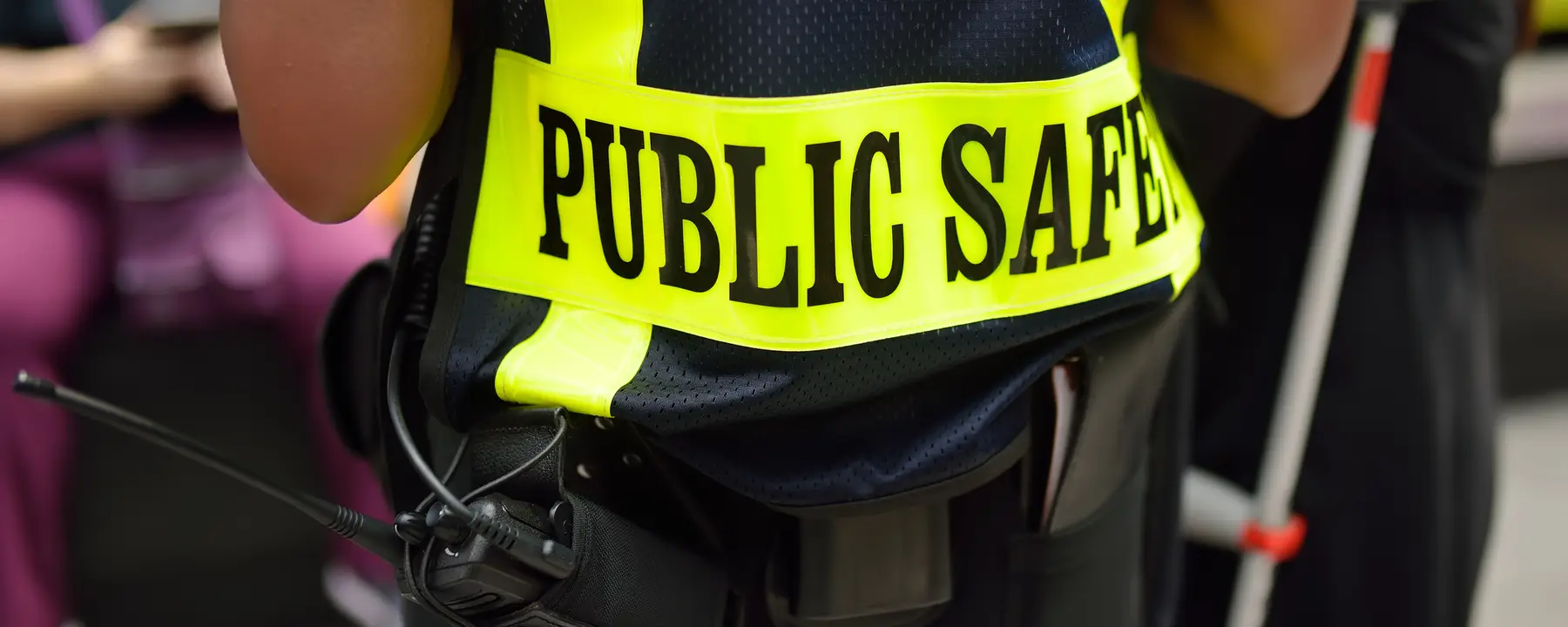Promoting justice system professionals’ health and safety.
Police and other employees within the criminal legal system cannot have long, sustainable careers nor effectively serve communities unless they are safe and well. With expertise in physical, social, and health sciences, RTI is uniquely positioned to promote criminal legal system professionals’ health and safety, addressing both physical and mental/emotional wellbeing.
RTI’s Justice Workforce Health & Safety researchers lead a multifaceted portfolio of work focused on assessing and addressing occupational stress and other psychosocial stressors within the work environment. We support injury prevention by developing standards for and testing personal protective equipment, such as ballistic- and stab-resistant body armor. RTI evaluates technologies designed to support officer wellbeing, such as mobile wellness apps for law enforcement, and the impact of employee wellness programs and resources on health and wellbeing, job attitudes and performance, and organizational outcomes. Our team also conducts applied intervention research, where we work in partnership with police departments and other justice organizations to plan, implement, and evaluate promising solutions for improving employee wellbeing through organizational change.
Project Highlights
Developing and Validating Self-Guided Wellness and Stress Management Tools for Law Enforcement Agencies
Law enforcement agencies strive to support officer wellbeing, but often lack the tools to identify the greatest challenges faced by officers and evidence-based mitigation strategies. Funded by the DOJ COPS Office, RTI International and the National Policing Institute developed the Customized Offerings for Mitigating & Preventing Agency-Specific Stress (COMPASS) toolkit to help agencies identify the greatest sources of stress for officers and implement health and wellness solutions that address those specific issues. COMPASS begins with a comprehensive assessment to measure stress across ten areas, including physical health/safety issues, staff fatigue/overwork, leadership issues, and anti-police sentiment. Users are guided by a step-by-step process for selecting a stress-reduction strategy that addresses their agency’s biggest health challenges; creating and executing an action plan; and assessing impact. COMPASS was scientifically developed and refined through practitioner input.
Stress Reduction Programs for Police Officers: What Needs to Change | RTI
Improving North Carolina Law Enforcement Access to and Utilization of Health and Wellness Programs: A Mixed-Methods Evaluation of the Responder Assistance Initiative
State and local public safety organizations seek to provide programs to improve mental health. Yet, the utilization and perceived effectiveness of such programs often vary greatly and are affected by factors such as lack of awareness of programs, stigma around seeking support, and programmatic offerings that are misaligned with potential users’ needs. The goals of this project, funded by the North Carolina State Evaluation Fund, are to examine the impact of the North Carolina Responder Assistance Initiative (NC RAI) on behavioral health service utilization by state law enforcement officers. The mixed-methods evaluation is guided by critical questions related to the expansion of NC RAI to local law enforcement agencies and other first responder populations across North Carolina, such as how to optimize the value and accessibility of NC RAI services and address disparities in service utilization.
National Institute of Justice Development of Equipment Standards and Compliance Testing Program (CTP)
The National Institute of Justice (NIJ) Standards and Testing Program fosters development of personal protective equipment standards and related conformity assessment programs that specifically address the needs of law enforcement, corrections, and other criminal justice agencies. The goal is to ensure—to the degree possible—that equipment is safe and reliable and performs according to established minimum requirements. The Criminal Justice Testing and Evaluation Consortium (CJTEC), run by RTI, supports these efforts by developing, validating, and maintaining NIJ’s criminal justice equipment standards, including the ballistic- and stab-resistant body armor standards and providing subject matter/technical experts and coordinating meeting logistics for NIJ’s Special Technical Committees (STCs), which are tasked with developing these standards and ensuring practitioners’ needs are addressed. NIJ has also tasked CJTEC with administering the NIJ Compliance Testing Program (CTP), which operates efforts to evaluate ballistic resistance of body armor, stab resistance of personal body armor, and autoloading pistols for police officers, in accordance with the requirements of NIJ standards.
Equipment Standards – Criminal Justice Testing and Evaluation Consortium (CJTEC)
Compliance Testing Program – Criminal Justice Testing and Evaluation Consortium (CJTEC)
Adverse Impacts of Organizational Stress on Officer Health and Wellness: Causes, Correlates, and Mitigation
The goals of this project, funded by NIJ, are to better understand the impact of organizational stressors on police and correctional officers’ health, wellness, and work performance; to inform law enforcement leaders and officers about these effects; and to identify steps to alleviate the negative consequences of organizational stress. RTI is collaborating with the National Policing Institute, the prime grantee, to collect and analyze agency administrative data, officer self-report measures, and ambulatory biomarkers to develop a comprehensive model of officer wellness. This study includes employees in both police and correctional organizations.
Association of State and Territorial Health Officials (ASTHO) Forensic Pathology Stress
The medicolegal death investigation (MDI) workforce faces unique work-related stressors. To call attention to these stressors and provide practical resources to mitigate stress and enhance well-being, RTI collaborated with ASTHO on technical assistance (TA) resources and a series of well-being workshops for forensic pathologists, medical examiners, coroners, and other MDI professionals. The workshops were presented as a special series of the Project Extension for Community Healthcare Outcomes (ECHO): Overdose Fatality Investigation Techniques (OD-FIT) trainings.
Episode 229 | Just Misperceptions about the MDI Community – ForensicRTI
Related Projects
Addressing Fentanyl Misinformation for a More Informed and Resilient Workforce
Read More about Addressing Fentanyl Misinformation for a More Informed and Resilient Workforce






